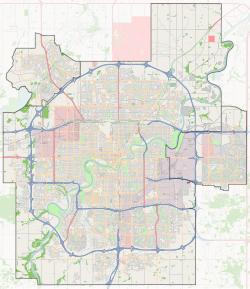Chinatown, Edmonton
| Chinatown and Little Italy | |
|---|---|
| Business revitalization zone | |

The Harbin Gates marks the entrance to Chinatown South.
|
|
| Location of Chinatown and Little Italy in Edmonton | |
| Coordinates: 53°33′18″N 113°29′13″W / 53.555°N 113.487°W | |
| Country |
|
| Province |
|
| City | Edmonton |
| Quadrant | NW |
| Ward | 6 |
| Neighbourhoods | McCauley and Boyle Street |
| Government | |
| • Mayor | Don Iveson |
| • Administrative body | Edmonton City Council |
| • Councillor | Scott McKeen |
| Elevation | 668 m (2,192 ft) |
Chinatown and Little Italy is a business revitalization zone (BRZ) created by the City of Edmonton, roughly comprising the informal Chinatown and Little Italy ethnic enclaves in the city's inner neighbourhoods. The boundaries of the BRZ includes only the "commercial strips" within those enclaves, and the BRZ itself straddles the official neighbourhoods of McCauley and Boyle Street.
Chung Kee or John Kee, was the first Chinese to settle in Edmonton, arriving by stage-coach from Calgary in late May 1890 to establish a laundry. In 1899 there were only 13 Chinese men in Edmonton, one restaurant and two laundries, about half lived in Strathcona. By the early 1900s a small Chinatown began to emerge after several Chinese merchants arrived to establish their businesses at the intersection of Namayo Street (contemporary 97 Street) and Rice Street (contemporary 101A Avenue). By 1911 the original 13 Chinese people residing in Edmonton had swelled to 154 (150 males, 4 females) and by 1921 it increased further to 518 (501 males, 17 females). From covering an area of 3 city blocks in 1911 (bounded by Jasper and Elizabeth Avenue as well as Fraser and Namayo Street, to expanding eastward as far as Kinistino Street (Modern 95 Street). Despite this substantial increase in size of the Chinese community, the Chinese people still only accounted for 1% of Edmonton's population.Source
In 1911, some 150 Chinese happily greeted the Xinhai Revolution by cutting off their queues and celebrating, although Sun Yat Sen did not visit Edmonton, he did visit Calgary in February 1911. In 1913, when Sun left the government of Yuan Shikai, Chinese Edmontonians formed a "Dare to Die Brigade" to go to China and support him. Trained by Morris Cohen (also known as General Two-Gun Cohen) they never got the chance to go to China, as Sun fled to Japan. In 1914, at the start of the First World War the Dare to Die Brigade offered to go to Europe to fight, however their request was turned down and they were disbanded. When Dr. Sun Yat Sen died in 1925, a large memorial service was held in Edmonton.
...
Wikipedia

